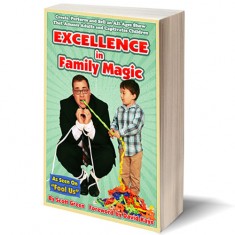Let's Make This Interesting: Finding Unique Premises for your Magic
Let's Make This Interesting: Finding Unique Premises for your Magic
(a guest post by Rob Teszka)
How many times have you seen the same old premise for a piece of magic? A card trick presented as a demonstration of gambling technique; the chop cup as a guessing game where the spectator always loses; the revelation of a thought-of word through "reading body language".
I don't know about you, but I find these premises trite, boring, cliche, or otherwise banal. The magicians that I really enjoy all present magic in a way that is engaging, unique, and interesting, and one way to get there is with a really good premise. Here are a few ways to find such a premise that I have found fruitful for my own magic; perhaps you'll find them useful too.
1. Ask why something happens.
I watched a bunch of chop cup routines, and the final loads were often limes. Um... WHY?? They've got nothing to do with the rest of the trick. They're a non-sequitur. They're surprising, sure, but they are an _unsatisfying_ surprise. So I thought--hm, maybe they're drink ingredients. Maybe I'm talking about a cocktail. Oh, maybe the red balls are actually cherries! Suddenly I had a chop cup routine about how the introduction of cheap, awful cherries ruined cocktails, and the only fruit that should be in a mai tai is the juice of a single lime--maybe two. I had some chopped plastic cherries made by PropDog, and now I have a unique chop cup routine where the audience isn't constantly losing. All because I asked a question about something I noticed in a classic magic routine. (No, you can't have my routine. Ask your own questions, it'll be more personal and unique and _better_.)
2. Draw on your background outside of magic.
I was an academic once. (I got better.) I conducted research in cognitive psychology on attention and perception, eventually linking it to concepts in magic like misdirection. That academic worldview and ideas from running experiments have found their way into my show as premises for magic. I open with twisting the aces, presented as a demonstration of how magicians manipulate attention through misdirection. It's like an illustrated academic lecture, but with colour-changing cards and laugh lines. It works for me because I have literally given academic lectures and taught about attention and researched misdirection using card tricks. I'll bet you have done all sorts of things outside of magic that you could recruit into the premise for one of your favourite pieces of magic. (This does require you to have interests outside of magic. Sorry.)
3. Know what you're talking about*.
If you have presentations for your magic that are about the history of gamblers, con artists, parapsychology, hypnosis, etc, you should know that audiences can smell bullshit. I can almost guarantee that there will be people in your audience who know more than you about whatever it is you're saying. So DO THE RESEARCH. Especially if you are presenting yourself as someone knowledgeable about such things. Don't say anything easily proved inaccurate, or inconsistent (either with itself or with other things you've said in your show). Be genuinely interested in the topic--that enthusiasm will shine through and bring the audience along with you. And by actually doing the research, you can find new and unique presentations! I wanted to do some parapsychology themed material, so I read through several books about it and learned about the Ganzfeld effect. If you look at a blank white space for long enough without external stimulation, your brain starts hallucinating. As a result, I finally found an interesting presentation for a coin and handkerchief routine that I'd been spinning my wheels on for _15 years_, where now the coin is a hallucination against a white handkerchief. (Again, this premise won't work for you; you'll find different ideas when researching whatever you're interested in.)
*[Unless your character is a raconteur and spinner of tall tales. If you're Pop Haydn or Quentin Reynolds or Andy from the Jerx you can say whatever you want. But do you see why it works for them, and what _kind_ of things they say and the way they say them?]
Note that these tools don't necessarily work independently. I asked questions about the limes because of my background in cocktail bartending. The misdirection twist talks about real academic concepts cos I really did the research. The Ganzeld coin and hank was an answer to the question "Why does the coin come from a handkerchief?". They all work together.
So if you're sick and tired of boring premises: try asking why something happens, drawing on your personal background, and researching your interests. I think you'll surprise yourself--and that's good for the audience.


0 Comments To "Let's Make This Interesting: Finding Unique Premises for your Magic"
Write a comment
Enter the code in the box below:
Note: HTML is not translated!